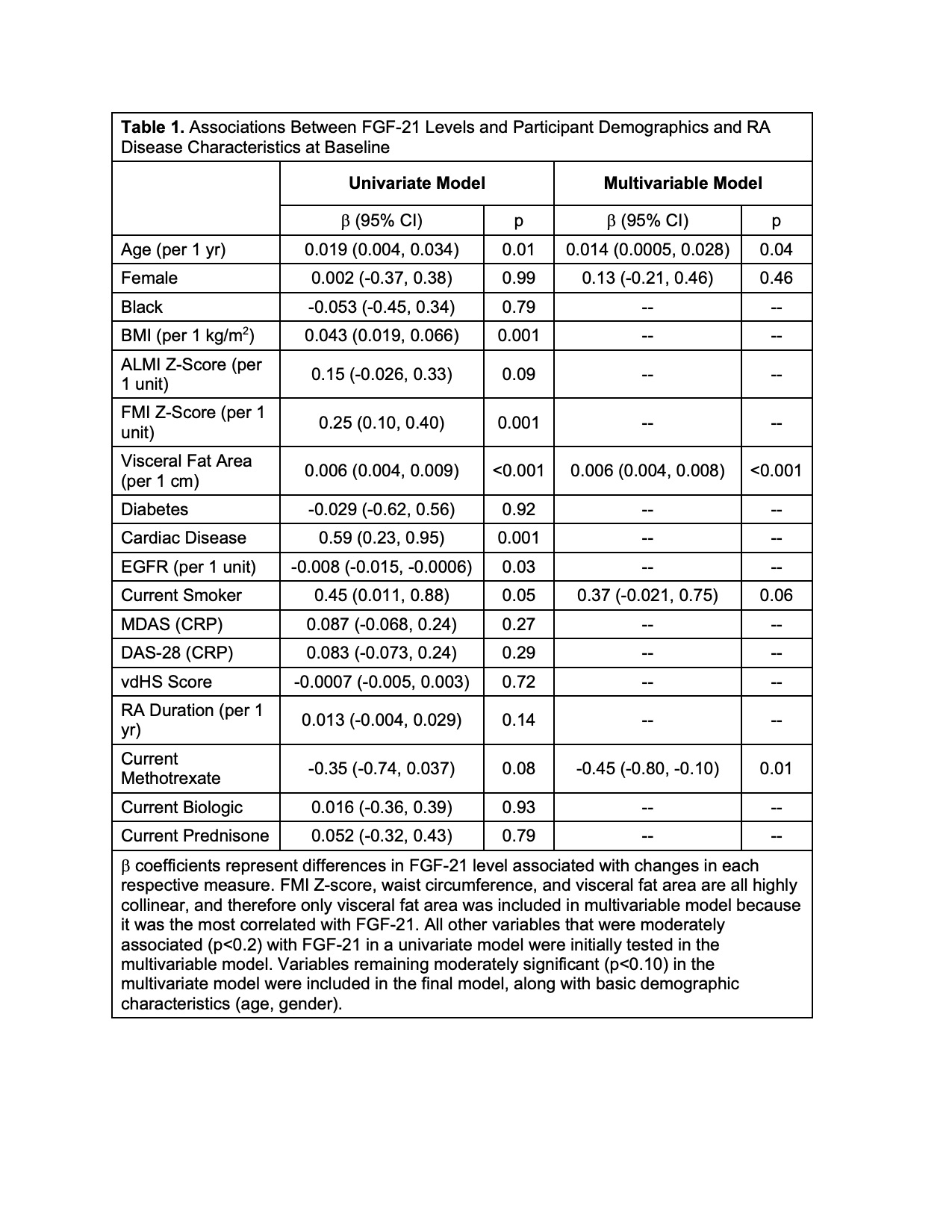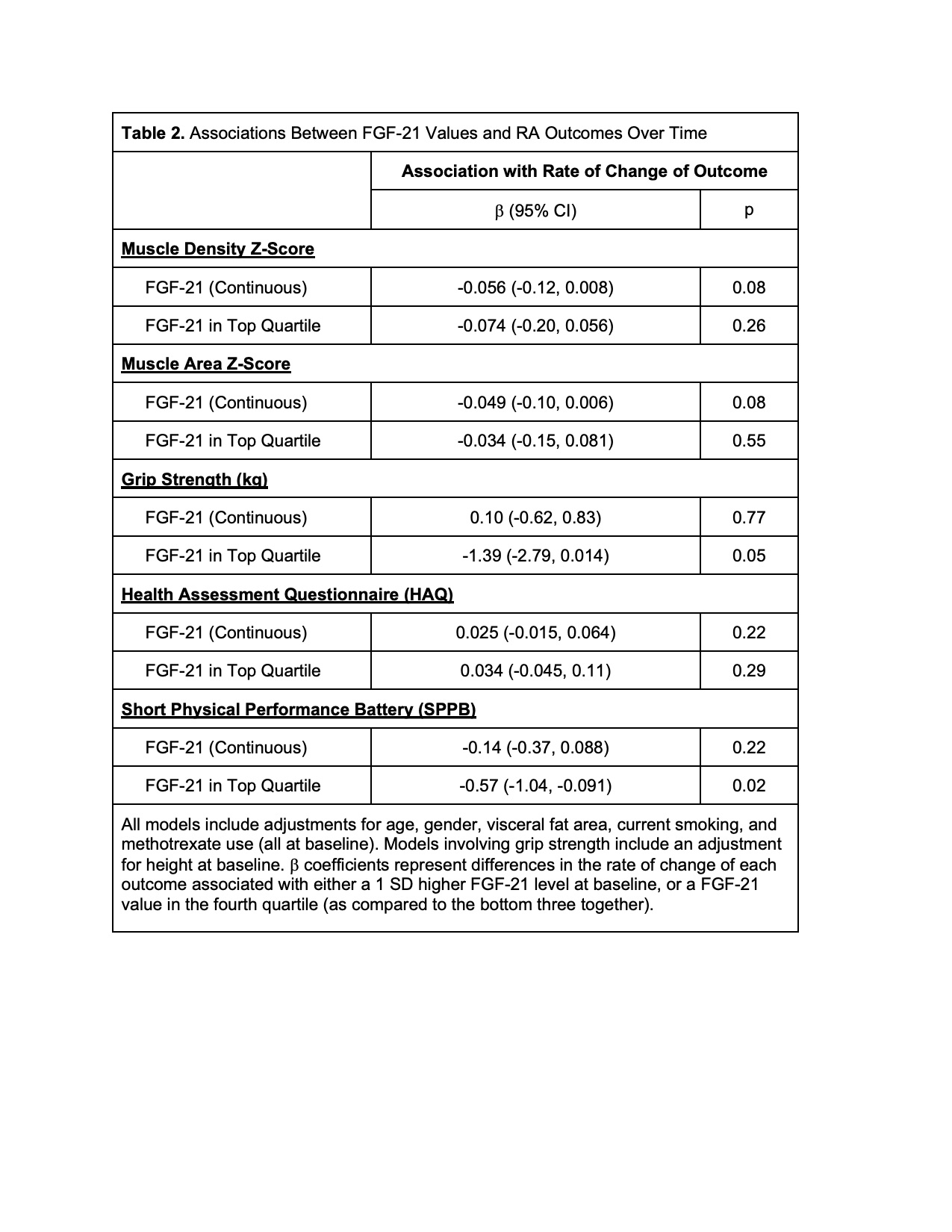Session Information
Date: Saturday, November 7, 2020
Title: RA – Diagnosis, Manifestations, & Outcomes Poster II: Biomarkers
Session Type: Poster Session B
Session Time: 9:00AM-11:00AM
Background/Purpose: Rheumatoid arthritis (RA) can lead to changes in body composition, including muscle loss and excess adiposity, which are in turn associated with physical disability. It is of interest to identify biomarkers that could help identify patients most at-risk for these changes. Fibroblast Growth Factor (FGF)-21, an adipokine associated with obesity, insulin resistance, and metabolic stress, is known to be elevated in patients with muscle stress conditions but has not been well-described in RA patients. In this study, we evaluated associations between FGF-21 and adverse changes in body composition and physical functioning in patients with RA, hypothesizing that levels of FGF-21 at baseline would be associated with worsening muscle deficits and physical functioning over time.
Methods: At baseline and follow-up, RA patients meeting 2010 ACR criteria, aged 18-70, completed whole-body Dual Energy Absorptiometry (DXA) and peripheral quantitative computed tomography (pQCT) to quantify lean mass, fat mass, visceral fat area, and muscle density. Dynamometry was used to measure strength at the hand and knee, and physical functioning was measured with the Health Assessment Questionnaire (HAQ) and the Short Physical Performance Battery (SPPB). Cytokines and inflammatory markers were measured at baseline, and serum FGF-21 was assessed using ELISA. Linear and logistic regression analyses assessed associations between FGF-21 levels, and body composition and physical functioning over 2-5 years of follow-up.
Results: 113 patients with RA were enrolled, and 84 (74%) returned for follow-up at a median (IQR) time of 2.7 years (2.30, 3.56). At baseline, higher FGF-21 levels were independently associated with older age, smoking, lack of methotrexate use, and greater adiposity (both total and visceral) (Table 1). The highest quartile of FGF-21 was associated with worse HAQ and SPPB scores, independent of other baseline characteristics (p=0.03 and p=0.01, respectively; data not shown). FGF-21 was not associated with common measures of RA activity or severity, including DAS28(CRP) and radiographic damage scores, but was associated with higher levels of specific inflammatory cytokines including TNF-RI, YKL-40, VEGF, and Resistin, before and after adjusting for visceral fat area (all p< 0.05, data not shown). Over time, higher baseline FGF-21 levels were numerically, but not statistically significantly, associated with greater worsening per year in muscle density and area z-scores [β=-0.056 (-0.12, 0.008), p=0.08; β=-0.049 (-0.10, 0.006), p=0.08], and the fourth FGF-21 quartile was associated with greater worsening in SPPB score [β=-0.57 (-1.04, -0.091), p=0.02] (Table 2). Higher FGF-21 (per SD) was also associated with a greater probability of clinically meaningful worsening of HAQ score [OR=2.37 (1.21, 4.64), p=0.01] (Figure 1).
Conclusion: FGF-21 levels were associated with obesity, physical functioning, and inflammatory mediators at baseline, and with worsening in muscle quality and physical functioning over time. These associations support the hypothesis that FGF-21 serves as a biomarker of metabolic stress that could predict greater functional declines in RA patients.
 Table 1. Associations Between FGF-21 Levels and Participant Demographics and RA Disease Characteristics at Baseline
Table 1. Associations Between FGF-21 Levels and Participant Demographics and RA Disease Characteristics at Baseline
 Table 2. Associations Between FGF-21 Values and RA Outcomes Over Time
Table 2. Associations Between FGF-21 Values and RA Outcomes Over Time
 Figure 1. Probability of a Clinically Meaningful Negative Change in Selected RA Outcomes at Second Visit, by Baseline FGF-21 Z-Score
Figure 1. Probability of a Clinically Meaningful Negative Change in Selected RA Outcomes at Second Visit, by Baseline FGF-21 Z-Score
To cite this abstract in AMA style:
Gould P, Zemel B, Taratuta E, Baker J. Circulating Fibroblast Growth Factor-21 Levels in Rheumatoid Arthritis: Associations with Disease Characteristics, Body Composition, and Physical Functioning [abstract]. Arthritis Rheumatol. 2020; 72 (suppl 10). https://acrabstracts.org/abstract/circulating-fibroblast-growth-factor-21-levels-in-rheumatoid-arthritis-associations-with-disease-characteristics-body-composition-and-physical-functioning/. Accessed .« Back to ACR Convergence 2020
ACR Meeting Abstracts - https://acrabstracts.org/abstract/circulating-fibroblast-growth-factor-21-levels-in-rheumatoid-arthritis-associations-with-disease-characteristics-body-composition-and-physical-functioning/
